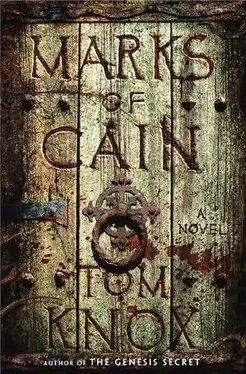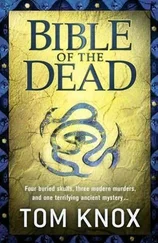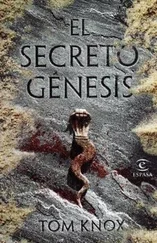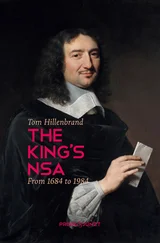Tom Knox - The Marks of Cain
Здесь есть возможность читать онлайн «Tom Knox - The Marks of Cain» — ознакомительный отрывок электронной книги совершенно бесплатно, а после прочтения отрывка купить полную версию. В некоторых случаях можно слушать аудио, скачать через торрент в формате fb2 и присутствует краткое содержание. Жанр: Триллер, на английском языке. Описание произведения, (предисловие) а так же отзывы посетителей доступны на портале библиотеки ЛибКат.
- Название:The Marks of Cain
- Автор:
- Жанр:
- Год:неизвестен
- ISBN:нет данных
- Рейтинг книги:4 / 5. Голосов: 1
-
Избранное:Добавить в избранное
- Отзывы:
-
Ваша оценка:
- 80
- 1
- 2
- 3
- 4
- 5
The Marks of Cain: краткое содержание, описание и аннотация
Предлагаем к чтению аннотацию, описание, краткое содержание или предисловие (зависит от того, что написал сам автор книги «The Marks of Cain»). Если вы не нашли необходимую информацию о книге — напишите в комментариях, мы постараемся отыскать её.
The Marks of Cain — читать онлайн ознакомительный отрывок
Ниже представлен текст книги, разбитый по страницам. Система сохранения места последней прочитанной страницы, позволяет с удобством читать онлайн бесплатно книгу «The Marks of Cain», без необходимости каждый раз заново искать на чём Вы остановились. Поставьте закладку, и сможете в любой момент перейти на страницу, на которой закончили чтение.
Интервал:
Закладка:
Amy said: 'But it's on the map. If it was demolished then why indicate it? I don't get it.'
David leaned nearer.
'So…maybe it wasn't demolished. It was turned into something else, probably before the war. The synagogue will be disguised as something else.'
'Like what?' 'Something insulting? Another joke, like in Luderitz.'
Angus nodded, firmly.
'Yes. This is true. The Nazis turned some synagogues into pigsties, some into nightclubs. To insult Jewish faith. Of course…'
Amy shook her head.
'There's no nightclub in Pskov. It's tiny — there's nothing bloody here, no dancehalls, no pig farms, no nothing.'
The farmer on the next table belched robustly as he finished his pig knuckle. And Simon was pointing.
'So what about that? Look.'
They all turned. At the top of the front wall was a small and grubby old window. It wasn't letting in much light because it was paned with dark stained glass, the colour of fortified wine.
But the dusty light, thrown by the Budvar sign outside, was sufficient to illuminate the window's leaded design.
It was a Star of David.
47
The publican was entirely uninterested in their bizarre request, and stranger questions — until David offered him three hundred euros.
Then he quickly brightened and took them to the back of the pub: where steel barrels concealed a wall.
It was painted with Hebrew script.
'Move the barrels,' said Amy. 'The Tabernacle must have been here.'
The steel barrels boomed and clanked as they were shifted. Under the barrels was…nothing. David felt a miserable disappointment, tinged with faint relief. Part of him actively didn't want to know what was under the castle. The proof of his blood. And part of him needed to know immediately.
The publican was staring at them. His arms were crossed. Beer stains dotted his white jacket. Then he said: 'Die Juden Tur?'
'Yes!'
'Hier.'
He led them down into a dark corner of the back room. A small wooden door was set low in the wall. The publican gabbled an explanation in gruff German. Amy interpreted, her voice rising with excitement:
'He says…this is the door from the war. There is a cellar behind, a passageway beyond that. He used the cellar to store…something he doesn't want to talk about. Contraband maybe? He doesn't know where the passage ends. He has never explored further. Too bloody scared of the communists in the castle.'
Another hundred euros elicited an agreement to open the door — then to close it behind them. And to tell no one.
Another fifty euros bought a torch.
The door was creaked open. David felt a surge of queasiness as he peered through. Another small door, a little door, like a Cagot door. The door he was always meant to pass through.
Inside, a few steps led down into a room full of damp darkness and cobwebs — and stacks of beige and grey Marlboro cigarette cartons, and a dozen garden gnomes. The gnomes leered in the sudden light; one of them was frozen in a fishing position. With grinning scarlet lips.
'OK?' said David, trying to quell his nerves. Now he could almost sense Miguel — nearing. Hunting them down. Blood finding blood.
'OK,' the others replied, as one.
They stepped inside the low chamber; the bar owner looked at them for a final second, shrugged as if they were obviously mad, then shut the tiny door.
Darkness enshrouded them. Apart from their one feeble torchbeam. David flashed it down the chamber, which went on, and on. A long passage into the chilly blackness.
'Let's go.'
They knew they had two kilometres to walk: the distance to Zbiroh. They began in silence. The sound of their footsteps slipping in the mud was the only noise they made. No one spoke.
Their hurried pace at last brought them to another door. An iron door. It was shut.
David slumped to the side. He could feel clammy mud on his back. He didn't care.
'Christ.'
Angus swore. Simon shook his head. David had his head weighed in his hands.
Another door. Just another door. That would stop them? He remembered all the doors he had been through these last weeks: the Cagot doors, the door in Navvarenx church, the door to the Holocaust museum, Jose's door in the Cagot house, all the many doors. And now another door, defeating them. Just one last door, one door too far.
Amy stepped forward, she turned the handle to the door. It opened.
48
As one they passed through the doorway into a dark, brick-walled room, with a concrete floor.
David spun the torch, left to right. It was a large space; wooden chests were piled in severely neat stacks on each side.
Angus walked across and directed David's torchbeam downwards, at one of the wooden chests. It had a motif burned into the surface: a large black Nazi swastika, clutched in the talons of an imperial eagle. And beneath it was an inscription, in Gothic lettering.
Die Fischer Experimente.
The lid of the first wooden case was easily prised off with Simon's pocket knife. Amy found a paraffin lamp, with a wick, sitting at the back of the chamber. They flicked a lighter and turned the knob: the wick sent a good light across the shadowy chamber.
And then, for an intense and concentrated hour, they sat in a circle — and deciphered the documents, by torchlight and lanternlight. With Amy interpreting the German, and Angus's knowledge of biochemistry and genetics, and Simon's appreciation of the politics and history, they were a tensely effective team.
As they speedily pieced together the last elements of the story, Simon wrote it down, once again, sometimes squinting close to see the documents proffered to his gaze. Every so often, Angus would exclaim, or swear — 'Fuck, so that's why, so that's what he found.'
Then Angus dropped the last document, and looked Simon's way.
'You're the writer. Finish the story.'
Simon looked nonplussed for a moment, struck by the horror of it all, their discoveries, and their predicament. Then he said, quietly, 'OK. So this is it. The last chapter.'
'Go on.'
'The first amazing discovery Fischer made was this: human speciation was happening. In Europe. Even as he watched. And it was the Cagots who were evolving.
'As a result of their linguistic, cultural and social isolation, the Cagots had become a new kind of human. A new species. They were still able to breed, with difficulty, with their close relatives, Homo sapiens — but they were genetically drifting away. Fischer guessed that in a few generations the last Cagots would die out, thanks to these breeding problems. Their speciation from normal humans would be a failure.
'Fischer relayed this information to Hitler, who was delighted. Here at last was proof that Nazism was just Applied Biology, as they had always boasted. Man truly differed from man. Indeed the racial differences within mankind were greater than even Hitler had speculated. Speciation was happening in Europe. It had happened to the Cagots…'
David glanced around, trying to contain his emotions. He wanted not to think of his own dark secrets, concealed in the vaults of his soul. Dooming him. Burying him under the concrete of his shame.
Then Simon turned a page.
'Through 1941, correspondence between the Fuhrer and his favourite scientist became ever more enthusiastic. Money poured into the camp to accelerate Fischer's experiments. Hitler wanted proof that Germans were superior within the emerging hierarchy of races.
'But then Fischer made a discovery at Gurs which was even more profound — and complicated. He predicted that the Cagot process would be repeated; he told Hitler that another species would soon splinter off from Homo sapiens, as the Cagots had done.'
Amy interrupted:
'The Jews.'
Читать дальшеИнтервал:
Закладка:
Похожие книги на «The Marks of Cain»
Представляем Вашему вниманию похожие книги на «The Marks of Cain» списком для выбора. Мы отобрали схожую по названию и смыслу литературу в надежде предоставить читателям больше вариантов отыскать новые, интересные, ещё непрочитанные произведения.
Обсуждение, отзывы о книге «The Marks of Cain» и просто собственные мнения читателей. Оставьте ваши комментарии, напишите, что Вы думаете о произведении, его смысле или главных героях. Укажите что конкретно понравилось, а что нет, и почему Вы так считаете.












